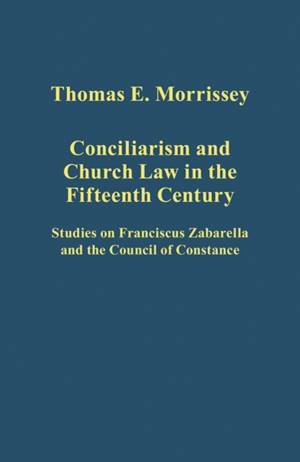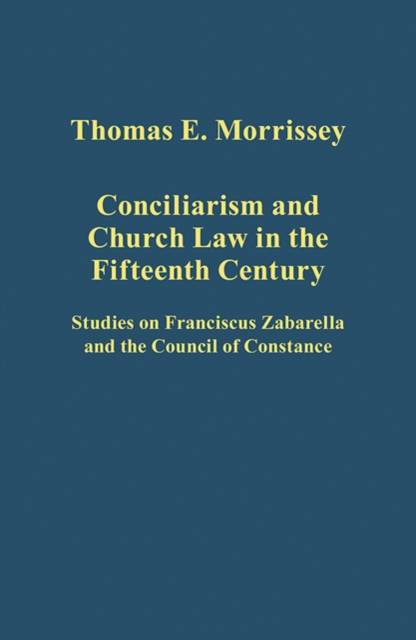
- Afhalen na 1 uur in een winkel met voorraad
- Gratis thuislevering in België vanaf € 30
- Ruim aanbod met 7 miljoen producten
- Afhalen na 1 uur in een winkel met voorraad
- Gratis thuislevering in België vanaf € 30
- Ruim aanbod met 7 miljoen producten
Zoeken
Conciliarism and Church Law in the Fifteenth Century
Studies on Franciscus Zabarella and the Council of Constance
Thomas E Morrissey
€ 221,95
+ 443 punten
Omschrijving
Crises are never the best of times and the era of the Great Western Schism (1378-1417) easily qualifies as one of the worst of times. As a professor of canon law at the University of Padua and later cardinal, and as a major theorist in the conciliarist movement, Franciscus Zabarella (1360-1417) tried to do what a good legal mind does: find and explicate a viable and legal solution to the crises of his time, a solution that would stand up in his own era and for the generations that followed. In this volume Thomas Morrissey looks at what he said, wrote and did, and places him and his thought in the context of the late medieval and early modern era, how he reflected that world and how he influenced it. Particular studies elucidate what he wrote on the authority and on the duty of the people in power, what they could do and should do, as well as what they should not do. They also show how he explored the area of early constitution law and human rights in civil and religious society and that his work leads down the road to our modern constitutional democratic societies. The volume includes two previously unpublished studies, on the situation in Padua c. 1400 and on a sermon from 1407, together with an introduction contextualizing the articles.
Specificaties
Betrokkenen
- Auteur(s):
- Uitgeverij:
Inhoud
- Aantal bladzijden:
- 366
- Taal:
- Engels
- Reeks:
Eigenschappen
- Productcode (EAN):
- 9781472423870
- Verschijningsdatum:
- 11/04/2014
- Uitvoering:
- Hardcover
- Formaat:
- Genaaid
- Afmetingen:
- 149 mm x 224 mm
- Gewicht:
- 751 g

Alleen bij Standaard Boekhandel
+ 443 punten op je klantenkaart van Standaard Boekhandel
Beoordelingen
We publiceren alleen reviews die voldoen aan de voorwaarden voor reviews. Bekijk onze voorwaarden voor reviews.











